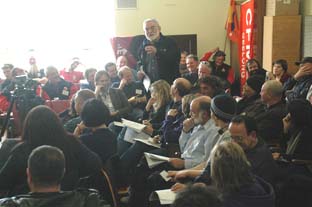
Union activist workshop Geelong 2006 Union activists travelled from Victorian country centres such as Port Campbell, Portland, Hamilton and the Latrobe Valley to Geelong to join union activists from Melbourne, Geelong and capital cities from all over the country to discuss the topic “Can militant unions thrive and survive under WorkChoices?”.
Geelong Trades Hall was packed with 130 unionists for a Trade Union Activists’ Workshop on October 28. Unionists came from a wide range of unions, with sizeable contingents coming from the Australian Manufacturing Workers Union, National Tertiary Education Union, the Construction, Forestry, Mining and Energy Union, Australian Education Union, Maritime Union of Australia, Community and Public Sector Union and the Communication Workers Union-postal and telecommunications branch.
Some of the activists attending were from industrial disputes in Melbourne and Port Campbell where Union Solidarity activists has run community pickets.
Some of the participants included workers from industrial disputes which have benefited from community picket lines run by Union Solidarity.
Geelong Trades Hall Council organiser Tim Gooden explained that although “Socialist Alliance initiated the workshop, it was open to anyone who wanted to participate regardless of whether they were members of the Labor Party, the Greens, Socialist Alliance or not in any party.”
He said that the workshop was organised because many trade union activists are frustrated with the strategy being used by the ACTU to fight WorkChoices.
“Everyone knows that we need to get rid of the Howard government and of course a Labor government would be a step forward from the Howard government but that’s not the end of the story,” said Gooden.
“The problem is that the ACTU has no Plan B for if the Howard government is re-elected or if the Labor Party is elected and then betrays the movement. There’s also the problem that the ACTU has only ever had an electoral strategy for fighting Howard’s anti-worker laws. They haven’t had an industrial strategy.”
“We organised the workshop to exchange ideas and experiences between unionists in different industries, unions and states,” said Gooden.
The workshop opened with French activist and academic Stephane Le Queux describing the struggle by students and workers in France early this year that defeated a law that attacked young workers. The victory was built on mass protests and civil disobedience.
Many activists from interstate were keen to learn about the Union Solidarity network and the community picket lines that have been happening in Victoria.
Union Solidarity was described as a broad union-community organization which supported any group of workers under attack, regardless of what union they were members of. It was explained that Union Solidarity operated on the principle that it was prepared to support any group of workers, the workers still make the decisions about how to run the dispute.
Activists from interstate reported that Union Solidarity had been set up in Perth and Workers Solidarity had been established in Sydney and was doing important work in solidarity with a sacked delegate at Botany Cranes.
Gippsland Trades and Labour Council secretary John Parker described the Gippsland TLC as being based on the principles of community unionism. That meant that the TLC was prepared to support any community group that needed support, as well as calling on the broader community to support workers’ picket lines and the campaign against the anti-worker laws.
Parker said that the community unionism approach was important because militant unions had become separated from the broader community. Militant unions had won wage rises, rights and conditions while millions of workers who didn’t have unions to fight for them had been left behind.
One workshop participant said that a dangerous trend in some unions is for union leaders to tell members that the union movement would be totally defeated if the Howard government is re-elected. “This is a very dangerous line,” he said, “because it can become a self-fulfilling prophesy. Of course we want to defeat the Howard government, but the union leadership has to build the confidence of members to fight any government that implements anti-worker laws.”
Various ideas were raised during the workshop for regional stopwork rallies, civil disobedience and non-compliance with some of the most draconian laws.
Other issues discussed at the workshop included how to involve more young workers in unions, how to fight the exploitation of guest workers, and the need for the union movement to oppose the Welfare to Work legislation.
It was pointed out that there wasn’t enough information about victories or new attacks being circulated between unions and between union activists in different states. Some union officials only find out about important disputes that their union is involved in in other states from reports in Green Left Weekly instead of from their own union.
Many unionists at the workshop expressed an interest participating in another workshop next year and in being kept informed through the establishment of an email network.
- Sue Bolton, Socialist Alliance national trade union committee convenor












No comments:
Post a Comment